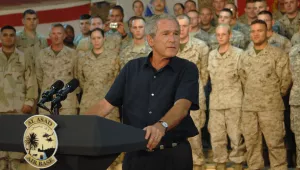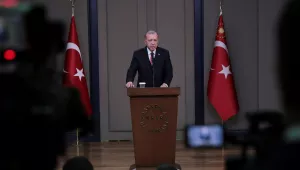While Americans have been welcoming the “end” of the war in Iraq over the past few days, a political crisis of serious proportions has been unfolding in Baghdad.
The fragile governing coalition that has teetered between dysfunction and collapse for the past year appears to be splintering, strained by personality clashes, governance disagreements and sectarian rivalries coming to a head.
Only a matter of hours after the last convoy of U.S. troops exited, the Iraqi government issued an arrest warrant for one of the nation’s vice presidents on terrorism charges; the prime minister urged Parliament to eject one of his deputies for calling him a dictator in the news media; unruly protests followed a vote in favor of greater provincial autonomy; and Iraqiya -- the Sunni-dominated political coalition in an uneasy alliance with the party of Prime Minister Nouri Al-Maliki, a Shiite -- walked out of Parliament. Meanwhile, Iraqi parliamentary leaders of various stripes are gathering in the northern Kurdish region, likely to debate their options for opposing Maliki’s “centralizing tendencies” and increasingly strong grip on power.
Some observers will point to this series of events as further proof that the U.S. should not have spent a moment longer trying to stabilize what is inherently an unstable country. But that is vastly oversimplistic. In actuality, the events of the last few days -- and the weeks and months ahead -- are better understood in the context of two specific developments.
Institutions Are Fluid
First was the withdrawal of all U.S. troops from Iraq well before the nascent political institutions had gelled. (Yes, that decision is widely viewed as having been made by the Iraqis themselves, but there is little question that the Barack Obama administration could have done much more to change their minds had it wanted to.)
The U.S. military presence in Iraq served several purposes, such as training Iraqi soldiers and police and helping them provide security. But for some time now its most meaningful function was as psychological ballast for the governmental and civic institutions so painstakingly crafted by Iraqis, with American and international help, since 2003. For eight years there has been a persistent tension between Iraq’s fledgling democratic institutions and the traditional Iraqi political culture -- which tends toward the authoritarian and the centralized.
In this competition, the new institutions survived and gradually strengthened in significant part because there was the perception that the U.S. was standing behind them. As long as American forces were in Iraq -- even in small numbers -- few thought that more “traditional” methods of resolving political disputes (through force or coercion or extra-judicial means) would be tolerated. The events of the weekend suggest that the departure of U.S. forces has removed that ballast and shifted the scales in favor of Iraq’s traditional political culture --at least for the moment.
The second frame through which to view the events of recent days is the spectrum of unresolved political issues, most important of which is disagreement over Iraq’s federal character. The constitution calls for a federal state, although the breadth and depth of this federalism have long been disputed.
Although many Iraqis were and are willing to accept a Kurdistan Regional Government with significant autonomy, far fewer believed the concept of federalism had any meaningful application to the rest of Iraq. The 2005 constitution provided a rough road map for areas other than the Kurdish region wanting to claim greater autonomy from Baghdad, but many Iraqis at the time considered this a theoretical gesture.
Opposition Is Fierce
Over the past year, however, several of Iraq’s Arab provinces -- frustrated with Baghdad and seeing the success of the Kurds -- have sought to move in this direction. These tentative steps have generated fierce opposition, from some who live in those provinces and especially from Maliki, and many in his Cabinet, who specifically but not exclusively see the dangers of oil-rich provinces assuming greater control over their resources. Longstanding disputes between Baghdad and the Kurdish regional government over the extent of the latter’s powers mean that both the road to and the endgame of a more federal Iraq are contested and ill-defined.
All this came to a head in the last week when Baghdad opposed the latest effort of an Iraqi province -- ethnically and sectarian-mixed Diyala Province, northeast of Baghdad -- to position itself to “become a region” and assume greater powers. Quickly, demonstrations and clashes with local security forces broke out in the province, and Diyala’s governor fled to the Kurdish region.
These developments were ostensibly an impetus behind Iraqiya’s walkout in Parliament. Even more significantly, they will almost certainly weaken the enthusiasm of the Kurds for supporting Maliki without further concessions.
The manner in which the current political crisis is resolved will be a harbinger for Iraq’s political path in the years ahead. If tensions are resolved in a way that clarifies and strengthens Iraq’s political institutions and reinforces support for them among all political, sectarian and ethnic factions, Iraq’s overall trajectory is much more likely to point upward, albeit at a modest slope. If, however, force is used to quell federal aspirations, to silence opposition and to consolidate the government’s power, one might anticipate a slide to a less democratic, more unstable Iraq.
In the past, the U.S. would have played a significant, if not necessarily determinative, role in resolving such a crisis. No doubt, the current ambassador to Baghdad, Jim Jeffrey, is busy trying to help Iraqis defuse the situation and chart a sensible way forward.
Consequences for Region
How this -- and future -- Iraqi political blowups are resolved matters hugely for the United States. Troops or no troops, the course Iraq takes has major bearings on American interests. Iraq’s orientation in the months and years ahead will be of great consequence for regional stability and the direction of continuing Arab revolutions, for international oil markets and their ability to meet rising energy demand, and for how the international confrontation with Iran will be resolved.
All of this underscores how modestly we should regard claims that the Iraq War is over. Yes, we have “ended” the aspect of the war that was in our power to end: the American military presence in Iraq. But it is far from the end of U.S. interests in Iraq. And it is not the end of Iraq’s ability to stabilize or inflame events in a critical part of the world.
For Iraqis, it is not the end of the difficult transition out of dictatorship and its many ugly legacies. For thousands of American families who lost loved ones, and tens of thousands of U.S. troops wounded, it is not the end of the struggle. Nor is it the end of America’s obligation to these veterans.
Hopefully, it is also not the end of the U.S.’s ability to think strategically about Iraq or to influence events there in favor of post-Saddam Hussein institutions over traditional political culture. As the Obama administration rightly underscored during Maliki’s visit to Washington last week, there are many ways in which the nonmilitary connections between Iraq and the United States can be strengthened.
Maintaining financial and other support for the large U.S. Embassy and civilian effort in Iraq will be critical. So, too, is translating still-nascent U.S. business interests in Iraq into real commercial ties between the two countries. Consolidating intelligence and other security links will be an important aspect of a transformed bilateral relationship, as will be continued mechanisms for discussing regional issues and aligning interests where possible.
Each dimension of a new, robust, nonmilitary relationship will be difficult to fashion and maintain. We have seen this already in waning congressional interest in Iraq and in Iraqi reluctance to take a tougher stand against the violence waged by the neighboring Syrian regime against civilians. So, rather than talk of ending the war in Iraq -- which makes such efforts more, not less, difficult -- we should talk of transcending the military relationship and realizing a more mutually beneficial one.
O'Sullivan, Meghan. “Troops Are Gone but Iraq War Is Not ‘Over’.” Bloomberg Opinion, December 20, 2011





